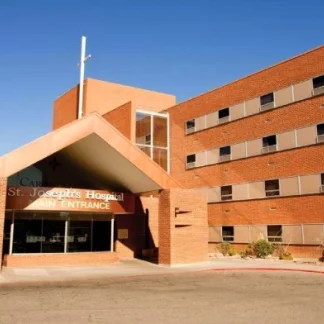Joan McNamara Center for New Directions
Joan McNamara Center for New Directions is a private rehab located in Tucson, Ar...
Carondelet Health Network - St. Joseph’s Hospital, located in Tucson, Arizona, offers mental health treatment to individuals struggling with a wide variety of behavioral health issues. If addiction is the primary diagnosis, a referral may need to be placed to an alcohol or drug rehab center that focuses on addiction treatment.
Carondelet Health Network – St. Joseph’s Hospital provides services for adults and the geriatric population. Their services include detox and inpatient treatment.
Detox The detoxification program is a medically supervised detox program that provides a safe environment for cleansing the body of addictive substances. Psychiatric and medical evaluations, medication monitoring, and crisis-intervention services are provided.
Inpatient Treatment The inpatient program offers stabilization services, individual therapy, group therapy, family therapy, psychiatric care, medical evaluations, and geriatric support services.
Private Insurance Carondelet Health Network – St. Joseph’s Hospital accepts most insurance plans, including Anthem, Wellmark, Blue Cross Blue Shield, Magellan, Amerigroup, Aetna, Cigna, and ComPsych. Out of network benefits may vary, so it is important to verify insurance coverage with your provider prior to enrolling in treatment.
Contact us for more information: (520) 617-1522

Connect with Carondelet Health Network - St. Joseph's Hospital by calling their admissions team directly.
(520) 617-1522 Website Get DirectionsThe Joint Commission, formerly known as JCAHO, is a nonprofit organization that accredits rehab organizations and programs. Founded in 1951, the Joint Commision's mission is to improve the quality of patient care and demonstrating the quality of patient care.
Joint Commission Accreditation: Yes
Research clearly demonstrates that recovery is far more successful and sustainable when loved ones like family members participate in rehab and substance abuse treatment. Genetic factors may be at play when it comes to drug and alcohol addiction, as well as mental health issues. Family dynamics often play a critical role in addiction triggers, and if properly educated, family members can be a strong source of support when it comes to rehabilitation.
Group therapy is any therapeutic work that happens in a group (not one-on-one). There are a number of different group therapy modalities, including support groups, experiential therapy, psycho-education, and more. Group therapy involves treatment as well as processing interaction between group members.
In individual therapy, a patient meets one-on-one with a trained psychologist or counselor. Therapy is a pivotal part of effective substance abuse treatment, as it often covers root causes of addiction, including challenges faced by the patient in their social, family, and work/school life.
Group therapy is any therapeutic work that happens in a group (not one-on-one). There are a number of different group therapy modalities, including support groups, experiential therapy, psycho-education, and more. Group therapy involves treatment as well as processing interaction between group members.
In individual therapy, a patient meets one-on-one with a trained psychologist or counselor. Therapy is a pivotal part of effective substance abuse treatment, as it often covers root causes of addiction, including challenges faced by the patient in their social, family, and work/school life.
In individual therapy, a patient meets one-on-one with a trained psychologist or counselor. Therapy is a pivotal part of effective substance abuse treatment, as it often covers root causes of addiction, including challenges faced by the patient in their social, family, and work/school life.
Joan McNamara Center for New Directions is a private rehab located in Tucson, Ar...
Mirasol, located in Tucson, Arizona, offers eating disorder treatment for women ...
Serenidad Counseling Services is a private rehab located in Tucson, Arizona. Ser...
Alpha Omega Counseling is a private rehab located in Tucson, Arizona. Alpha Omeg...